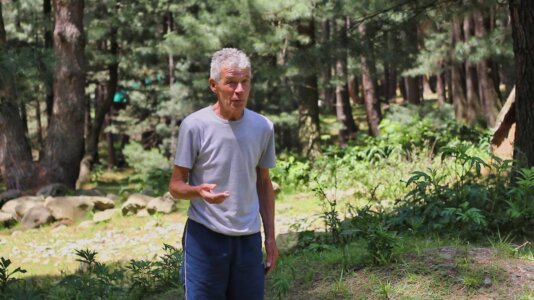- About
- Topics
- Picks
- Audio
- Story
- In-Depth
- Opinion
- News
- Donate
-
Signup for our newsletterOur Editors' Best Picks.Send
Read, Debate: Engage.
| August 26, 2023 | |
|---|---|
| topic: | Conservation |
| tags: | #Kashmir, #eco-tourism, #Waste Management, #pollution |
| located: | India |
| by: | Sameer Mushtaq, Suhail Bhat |
David Finn, a 70-year-old Englishman, has been visiting Kashmir regularly over the past 30 years to find solace in the tranquility of its landscape. This year, having lost one of his lungs to cancer, Finn travelled there once again to recuperate.
"Look at Kashmir," he marveled at the mountain range surrounding him, as he spoke to FairPlanet. But he expressed concern about the growing number of tourists and its disastrous consequences on the local ecosystem. "Do not destroy the [environment] if you are coming here," he said, adding that he had observed tourists carelessly discarding trash in public and in nature.
Kashmir has experienced a three-year surge in tourism, with roughly 18 million visitors in the past year alone. But while this influx has been viewed as a welcome economic boost for the local area, it also represents a substantial threat to the region's delicate environment.
Many of the region's popular tourist spots are currently grappling with overcrowding, reaching their maximum capacity and experiencing a surge in litter due to the sheer volume of tourists. A substantial portion of this waste finds its way into rivers or forests due to inadequate waste management facilities.
Moreover, unregulated construction, increased traffic and human interference are contributing to the destruction of ecosystems that are vital for both plant and animal life.
The area most affected is Pahalgam, tourists leaving behind approximately 20 metric tons of litter in its vicinity daily. The inadequate waste management infrastructure in the region leads to a significant portion of this litter, particularly plastic, making its way into forests and rivers. At the same time, the rise in both traffic and construction activities is diminishing the available pristine habitats for local flora and fauna.
In order to raise awareness about the detrimental environmental effects of unregulated tourism, Mushtaq Ahmad, along with his NGO, the Himalayan Welfare Trust, consistently visits the communities most severely impacted. A native of Pahalgam, he has dedicated his life to disseminating information and enhancing the well-being of his community.
Since establishing the NGO in 2008, Ahmad, alongside a group of volunteers, has organised seminars and cleaning initiatives aimed at mitigating the adverse effects of tourism in the region.
"We have trained thousands of volunteers and prepared them. Where we don't reach, they reach," he told FairPlanet. "Tourists and hikers who come to these regions have no knowledge about [how to properly dispose of] garbage and litter. When we make them aware, we get one benefit: they [pass on the knowledge] forward."
Riyaz Qureshi, who leads the Department of Tourism at Kashmir University, openly recognised the substantial environmental concerns posed by tourism in the area. Speaking to FairPlanet, he stressed the urgency of raising awareness among the general population regarding the detrimental effects of tourism and advocating for eco-friendly or sustainable tourism practices.
He underscored several key issues, including the use of plastic in sensitive ecosystems, unregulated construction and development near water bodies and riverbanks, all of which have a harmful impact on the environment.
Notably, the existing waste treatment facility at Pahalgam's tourist destination, with its limited capacity of 10 metric tonnes, is insufficient to address the needs. But the government has proposed a solution and intends to enhance the facilities at this location.
"We are planning to set up two more waste treatment facilities to cater to the increasing waste generation in Pahalgam," Tariq Naik, Chief Executive Officer of the Pahalgam development authority, told FairPlanet.
Amid these rising concerns, Sagg Eco Village emerged as a locally-developed solution. Nestled between the mountains of central Kashmir and on the foothills of River Sindh, this village, which is a for-profit initiative, champions a sustainable way of life girded on principles of eco-tourism and a zero-waste policy.
A decade ago, Fayaz Ahmad Dar, in collaboration with several like-minded activists, established Sagg Village in Ganderbal - a district which, unlike other parts of Kashmir, has managed to preserve its distance from mass tourism. Dar, an entrepreneur and former farmer, integrated local residents into the initiative from the very beginning, and currently employs 15 locals in his village.
Notably, all the produce in his garden is organic, in alignment with the village's name, Sagg, a Kashmiri term that means 'nurture.'
"All the farming that you see here is natural. We have our own composting programme, including a composting programme for human waste, which is functional and a rarity in today's development," Dar told FairPlanet.
He added, "The buildings we have built [in our village] use local materials and traditional cultural designs, which are more environmentally and health-friendly. The food we serve is made from natural ingredients and traditional recipes. We also use some traditional recipes and foods to preserve some of the produce from the farm, such as pickles, jams and dried items."
Tourists come to the village seeking a taste of a more sustainable and natural way of life, along with the opportunity to savour locally grown traditional Kashmiri cuisine. But the area draws both locals and tourists alike. For the locals, it symbolises a return to the traditional, uncomplicated and natural way of living that they've gradually departed from over the years.
Dar further expressed his mission of reintroducing the inherent concepts of "connectedness" and "integratedness," which are found in nature and the design of life, into our daily lifestyle.
"Everything is connected and everything affects everything else," he reflected. "So, at the core of all these problems that we are seeing - plastic, environmental degradation, water depletion or the oceans getting dirty - it is a symptom. All of these symptoms will lead back to the alienation of a human being from their own selves and the environment."
Dar claimed that the entire area, that the entire area, spanning approximately 1.5 acres, was formerly arid and overgrown. He explained that they transformed it progressively by clearing thorns and rocks, replacing them with trees and plants and constructing structures using the rocks they had removed.
"The farming practices here are fully organic, and their composting schemes, which include one for human waste and are unusual in modern agriculture, complement this," he said.
Dar further emphasised their dedication to lowering imports and pointed out that the village is working to maintain a staff and product base that is 90 per cent local. "The infrastructure work and operational roles are managed by locals," he explained.
The village also maintains a limited visiting capacity of 60 people per month in order to avoid over-crowding. "Our strategy attempts to avoid an inflow of tourists from taxing the site's resources and endangering the ecology."
He pointed out that this initiative has a twofold objective: encouraging tourists to discover the principles of sustainable living and actively engaging the local community while they're at it. He conducts awareness campaigns for the locals, educating them about sustainable living practices, and intends to extend his initiative to neighboring villages and farmers.
His vision is to integrate them into his project and establish a circular economy that will ultimately bring benefits to the entire community.
But Dar's approach to promoting eco-tourism in Kashmir is not without flaws, it appears. Waseem Ahmad, a researcher specialising in rural tourism at the University of Kashmir, told Fair Planet that the influence of the eco-village on broader issues could be somewhat constrained, and questioned its capacity to tackle systemic challenges on a more expansive scale.
He pointed out that setting up the eco-village might in fact lead to a surge of tourism in the area. "The increased footfalls increase the threats to the environment and that exacerbates the environmental challenges rather that solving them," Ahmad told FairPlanet.
He highlighted that the expenses associated with implementing sustainable technologies and practices might render the eco-village less accessible to lower-income individuals, which could in turn create to socio-economic disparities within the community.
Image by Sameer Mushtaq
By copying the embed code below, you agree to adhere to our republishing guidelines.
![\'Do not destroy the [environment] if you are coming here.\' \'Do not destroy the [environment] if you are coming here.\'](https://www.fairplanet.org/wp-content/uploads/2023/08/picture-5-534x300.1692970209.jpeg)


